The New South Wales Government
Placeholder for article on New South Wales Government
Placeholder for article on New South Wales Government
5.1 Purging disloyalty

'Divide and Conquer' in Caesar's Gallic Wars - 'Vercingetorix Throws Down His Arms at the Feet of Julius Caesar', 1899 painting by Lionel Noel Royer.
The political strategy of dividing one’s enemies in order to secure power is tried and proven. Compared with a united and focused force; fragmented, smaller enemies made to become suspicious of each other, are distracted and weakened. The Latin origin ‘divide ut regnes’ is indeed ancient and can at least be traced back to Julius Caesar picking off his enemies by siding with individual tribes in disputes with their local rivals.1
NSW Premier Bob Carr’s acclaimed political idol, Abraham Lincoln across the globe 140 years prior, had clasically employed a ‘divide and conquer’ strategy in late 1863 during the US Civil War by ordering the seizure of Chattanooga, which was a major rail distribution centre of the Confederacy.2
In the aftermath of Carr’s March 2003 electoral win, Carr had withstood the Amery-led internal party revolt against him. But as elected leader Carr was entitled to punish disloyalty and quell the threat to his leadership. Carr’s dumping of the factional leaders Amery, Aquilina and Obeid from their Cabinet portfolios and reshuffled his cabinet with new blood was a candid reaction to secure his survival.
But pre-meditated 'divide and conquer' political strategy was not Carr's style. His reactionary purging was a survival response against those disloyal and personally mutinous against him. Long term political consequences would likely not have factored at this time of crisis decision making by an incumbent elected leader.
Carr was committed to his autocratic ‘cult of the leader’ ethos.3 Some may argue Carr employed his own faction, but as elected leader Carr's authority was immediately democratically legitimate and so legitimately incontestable.
Carr’s purging was a straight-shooting response to undermine illegitimate factional power. Purging of the left and right factions from the Government’s senior ranks had them licking their wounds. Capable and ambitious politicians had been banished by their leader and they must have naturally felt a common sense of injustice. The purging did not divide and weaken factional resolve, rather it only served to unite them against him - common purging sowed a common united enemy. Carr’s previously disparate Right subfactions, the Trogs and the Terrigals which had been bitter rivals, united in a common anti-Carr cause. What Carr’s purging did achieve though was to buy Carr more time at the helm.
When Carr chose his new NSW Ministry in the week following the March 2003 Election, he had cast adrift ambitious members of the Right, Left and Centre Left factions. Carr’s less factionally-aligned selection of Scully, Knowles, Egan, Della Bosca, and new bloods Sartor, McDonald, and Costa amongst others, would have sent a clear message to the factions that their disloyalty and opportunism was unwelcome to say the least.
Chris Christodoulou from Workers Online provided useful insight of the factional fallout at the time:
““Bob Carr quite rightly had the authority to have a substantial say in who he got. However whilst he cracked the factional system, he certainly didn't smash it. In some ways what happened last week was the worst of all systems. A halfway house between a non-factional system and a factional system, which, in the end, gave Bob Carr some of what he wanted, gave the factions some crumbs to argue about but overall came up with the result which has left a bitter taste in the mouths of many in the Caucus including some in the Ministry.”4
So factional disconnect over Carr’s purging of factional players from the NSW Cabinet brewed in the aftermath of the March 2003 election. Amery, Aquilina, Obeid, and Lo Po were out. Whelan had retired and Aquilina had been demoted.
But Scully, despite his comparably embarrassing performance and remaining a prominent member of Labor’s factional right, instead of being ousted was simply side-shifted from Roads and Transport into Housing. Why, remains unclear. Was Scully’s preservation simply an unaccountable outcome of Carr’s personal favouritism? Was it down to “a political fix…more designed to fit ministers' personalities”, as journalist Quentin Dempster observed in his 2005 analysis ‘Media rules in the court of Carr’ 5? Those in the party machine on the outer observed this and Scully became marked for future factional back stabbing.
5.2 When factions can unseat an elected leader
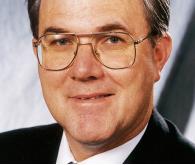
Richard Amery MP
Amery’s attempted coup of an elected leader had failed, but it had demonstrated that such a caucus move could work if the numbers were there. It had set a dangerous precedent as a factional device. It also signaled that there was a political rebellion plotting and scheming and waiting for another opportunity at power.
Historically, whether appropriate or inappropriate, factionalism is a part of political party life – Liberal, Labor and increasingly The Greens as they reach out to appeal to the diverse mainstream.
The Australian Labor Party has formalised factions, divided mainly into Labor Unity (on the right) and the Socialist Left.6 In NSW Labor Unity (or Centre Unity) has since before Carr’s term been divided into sub-factions of the Trogs and Terrigals.
Immediately after the Carr Government March 2003 election win, the combined factional forces of the Trogs and Terrigals headed up by Corrective Services Minister Richard Amery had sough to defy Carr’s leadership, but the mutinous move was defeated in the ensuing Labor Caucus ballot.
While Carr was criticized for making the NSW public service more accountable to ministers, to the Parliament and therefore to the people and that he oversaw the sackings of many in the public service for substandard performance, Carr was consistent in applying the same standards of public accountability up the chain to his ministers. So when a Premier dismisses a minister for poor performance it is a prerogative. Only the Premier has the power to do so.
That ministers disaffected with their leader should have the power to unseat that leader, who is democratically elected, would seem to be a prima facie undermining of the democratic process. Internal Party support for a Party leader is one of internal political machinations. But once in elected office, internal party machinations have no legitimacy. When internal Party machinations can undermines a Premier elected by the people only days prior, such machinations become authoritarian.
Indeed the results of the Labor caucus ballot held just after the March 2003 election, in April supposedly, were not made public. The Labor caucus process is not a public process. It is an internal Labor Party process, yet the outcome has the power to unseat a democratically elected head of government.
Such a process has just occurred at Australian Federal level, in which a factional ballot has resulted in Julia Gillard’s sudden toppling of Prime Minister Kevin Rudd on 24th June 2010. Gillard’s coup was copybook NSW Right strategy that has dispensed with a queue of NSW state Labor premiers.
.jpg)
PM Rudd with Deputy PM Gillard in 2007
““Wait until the leader's position is so brittle it just needs a quick panic and the deed is done.” And it is Mark Arbib, now NSW senator who keeps popping up as the suspect coup architect. Federal Opposition Leader Tony Abbott has likened the strategy to ‘NSW mafia style’.7
‘Mark Arbib, the NSW machine man, now has the scalps of three Labor leaders on his belt’8 – Nathan Rees, Morris Iemma and Kevin Rudd. The problem is each was a democratically elected leader of government and Australia is not a dictatorship.
It is an issue of timing. To maintain faith with the electorate, such a leadership ballot should be restricted to only be held as part of a general election process. In this way, the electorate would retain democratic power in its choice of leader throughout the elected term of office. This provides trust and stability in government. Similarly, electorate alignment ought to apply to Party conferences that decide policy. It would be disingenuous for any political party to seek election and short afterward have its policies and leadership changed in an internal Party process that excludes the electorate. An electorate only gets a one in four year opportunity to choose the government. Voter decisions are made according to the presented party leadership and policies. No government has an electoral mandate to substantially change its leadership or policies mid-term.
5.3 The Right Dinner
As 2003 drew to a close and following Carr’s ‘generational change’ reforms in his Cabinet, in December 2003, some twenty-four NSW Labor MPs comprising the Right’ rival splinter factions - the Terrigals and Trogs met for dinner. They “quietly left the Macquarie Street precinct to dine together across town” at the Southern Italian restaurant, 'al Ponte', at Harbourside Darling Harbour.9
.jpg)
'al Ponte' Italian Restaurant at Harbourside, Darling Harbour (right hand side). Now trading as 'Criniti's'.
“The dinner comprised almost half of the lower house NSW Labor caucus. Both subfactions had been banished from Carr’s new cabinet following the Carr’s triumphant election win earlier that year. Dinner-goers that night included Trogs: Richard Amery, Tony Stewart and Marie Andrews and Terrigals: Joe Tripodi, Carl Scully, Reba Meagher, Karen Paluzzano, Angela D'Amore, Morris Iemma and Grant McBride and left-winger turned right-winger, Pam Allan amongst others (Obeid was sick)".10
Journalist with the Sydney Morning Herald at the time, Paola Totaro, opined that this dinner was a ‘kiss-and-make-up’ or ‘breaking bread’ exercise between the two Right sub-factions.11 They were united in their annoyance with Carr’s autocratic style, and about Carr’s cabinet reshuffle, his overhaul of the ministries, the blood letting of departmental heads by Carr’s new team (Della Bosca, Knowles, Costa, Egan) and over Carr’s new policies such as his new tax on poker machines12, which had attracted outrage from the influential club industry. Both Terrigal chiefs Eddie Obeid and Joe Tripodi had been denied a ministry, and similarly Trogs chiefs, Richard Amery and Tony Stewart.
One left-winger described the rapprochement thus:
"What is their uniting force? As always it is ambition and bitterness. Ambition on Carl Scully's side and bitterness on the part of Joe Tripodi who has been denied a ministry. "Oh, and of course their desire to put together an opposing force to Carr and the Knowles, Della Bosca, Egan troika."13
Carr’s appointee Craig Knowles then heading up the new Department of Infrastructure Planning and Natural Resources came under criticism for having sacked a very competent senior manager, well respected within the industry."14
For the Right and one key player at the dinner, it's about "equity" and a greater say in the affairs of Government: "Bob Carr is the best Premier we've had. We want him to stay on but we want some equity in the make-up of the cabinet as well."15
The sense of injustice over Carr’s cronyism and desire for populism fueled a desire for factional vengeance that would brew for the next two years. Talk about injustice, moved on to plotting which would have continued out of the public gaze throughout 2004 and 2005. That factional vengeance may well have been one reason why by July 2005, Carr had been worn down by the Party ‘machine’.
During 2004, Carr and Egan had handed down a budget that applied new land tax revenue to up to a quarter of a million NSW property owners in order to take “a bit of the heat out of the investment property market." But the budget forecast the NSW Government deficit to rise to $300 million and planned to shed up to 3000 public sector jobs as part of Carr’s amalgamation of departments into new super departments.16
Economically, NSW was starting to lag behind the other states. Many weren’t happy – the property sector including developers and business – essentially the supporters of the Right.
Then six months prior to Carr’s resignation, Treasurer Michael Egan quit at a time when NSW Labor had sunk to all-time low in the opinion polls. Egan reasoned:
“because after 35 years of political combat, I think it's time for me to move on“ and… “if I didn't take it now, the next opportunity would be in four years, because I think it's important that my successor have the opportunity to show his or her wares before the next election, have a couple of budgets under his or her belt.”17
Was Egan’s ‘political combat’ a reference to factional infighting?
The factional influence and informal power of the factional powerbrokers Eddie Obeid and Richard Amery continued to build as well as relative newcomer and Terrigal confidant Joe Tripodi. As journalist Totaro concluded, they were starting to assert themselves as kingmakers.
[Next Chapter ] [Previous Chapter ]
[1] http://en.wikipedia.org/wiki/Divide_and_rule
[2] http://ngeorgia.com/history/chat.html
[3] Bob Carr, ‘Bob Carr's Reading List’, http://newmatilda.com/2008/05/22/bob-carr-reading-life
[4] ‘Factional Free-For-All’ by Chris Christodoulou, Workers Online, April 2003,
http://workers.labor.net.au/features/200304/a_guestreporter_chris.html
[5] Quentin Dempster, Media rules in the court of Carr, 2005, Griffith Review, 3Ed,
http://www.griffithreview.com/edition-3/116-reportage/490.html
[6] http://en.wikipedia.org/wiki/Australian_Labor_Party
[7] Tony Wright, ‘A faction too much friction’, 26th June 2010, Sydney Morning Herald,
http://www.smh.com.au/opinion/politics/a-faction-too-much-friction-20100625-z9t2.html
[8] Andrew West, ‘Arbib might have installed Gillard but opponents warn she's no puppet’, 25th June 2010, Sydney Morning Herald, http://www.smh.com.au/opinion/politics/arbib-might-have-installed-gillard-but-opponents-warn-shes-no-puppet-20100624-z3pw.html
[9] Paola Totaro, ‘Terrigals and Trogs dine out on Carr's fate’, 27th December 2003, Sydney Morning Herald, http://www.smh.com.au/articles/2003/12/26/1072308679206.html
[10] Paola Totaro, loc. cit
[11] Paola Totaro, loc. cit.
[12] Paola Totaro, (State Political Editor), ‘Carr's property tax revolution’, 7th April 2004, Sydney Morning Herald, http://www.smh.com.au/articles/2004/04/07/1081222477449.html
[online material accessed up to 23rd August 2010]
4.1 Carr’s leadership ethos
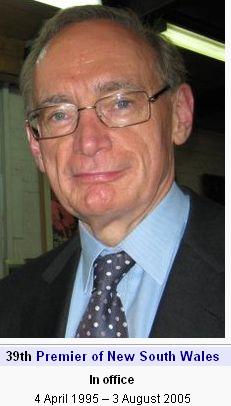
NSW Premier Bob Carr has been described by political lecturer Shelly Savage as ‘urbane, literate or, most commonly, bookish’.1
Eastern Suburbs Sydney born and raised, Carr graduated with honours in History (UNSW), then became a skilled journalist and reporter with a keen focus on politics, before he won the NSW Labor 'Eastern Suburbs' Seat of Maroubra in 1983 at age 36. Aligning himself with Labor Right faction, he was quick to assume ministerial portfolios in Planning, Environment, Consumer Affairs and Heritage before Labor lost power in NSW. Carr aspired to foreign affairs but was pressured by his own Right faction to become Labor Opposition Leader.2 It was however, Carr’s twelve years in the rough and tumble as Opposition Leader that would shape his ten year Premiership from 1995.
A devotee of 19th Century US President Abraham Lincoln, whether coincidentally or otherwise; Carr in some ways emulated Lincoln’s scholarly charisma, his authoritative determined persona, his passion for reading and learning, his power of oratory, and coincidentally his physical likeness.
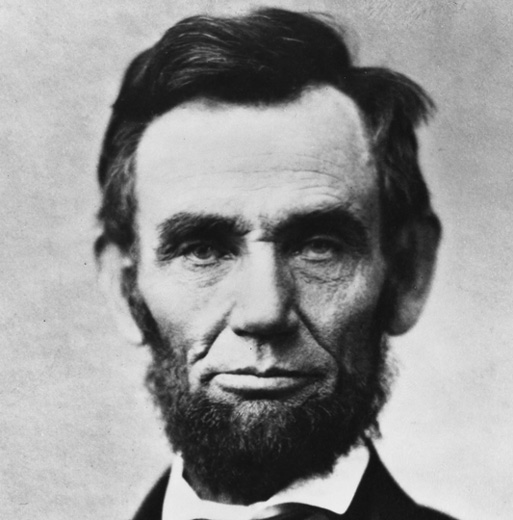
16th US President Abraham Lincoln [1809–1865]
Like Lincoln, Carr conducted himself as a statesman and felt he had a moral contract with the ordinary citizen.
Carr claims he was a ‘reluctant leader’3, originally seeking a career in foreign diplomacy. But career opportunities sometimes are life’s fate, and once he had resolve to lead the NSW Labor Party he managed to remain popular with the electorate for three and a half four year terms and eventually to choose the timing of his departure. In contrast, Lincoln had been a born leader and lived through a tumultuous time of civil war in another era, in another country. Lincoln’ personal and political life became a perpetual struggle against successive failures.4 Lincoln’s ideological commitment to emancipation alienated many. Southerners hated Lincoln for his contribution to the Civil War casualties and ending slavery and many Northerners hated Lincoln for being too soft on the South, and tragically in 1865 Lincoln did not chose is departure.
But where Lincoln had been a visionary reformer, passionately committed to individual human rights and to the principles of democracy, liberty, and equality5; Carr was politically pragmatic, a popularist but hypersensitive to public opinion about his self image and reputation.
Philosophically distinct from Lincoln, Carr believed that politics was never solely about the ‘cause’ or the ‘movement’ understood as an abstract or ultimate value.
According to political analyst Tim Soutphommasane, Carr was not driven by a radical reformist agenda. ‘He was no ideologue in office, nor did he claim to be. ‘Ethos is more important than ideology’; meaning that the ends can justify the means so long as political power is exercised appropriately and consistent with one’s philosophical tradition.6
Soutphommasane suggests that Carr’s leadership ethos was premised on a stoic ethics philosophy, specifically in the tradition of the Meditations of Roman Emperor Marcus Aurelius. It posits accepting and working with nature and life’s events rather than presuming power entitles one to control nature and shape events. Rational thought and detached decision making in the Marcus Aurelius tradition is good a guide to practical politics to avoid the risks of emotive decision making. Adhering to a stoic discipline was for Carr the vital ethos of a wise statesman.
But in the execution of Premiership, Soutphommasane suggests that Carr was inspired by the approaches of NSW former Labor Premiers William McKell (1941–47) and Neville Wran (1976-86) - deliberately one of moderate change management at a pace modelled on ‘gradual reform and compromise’. Hard-line radical reform was rejected as problematic risk-taking attracting unnecessary confrontation, turbulence and bellicosity.7 That both McKell and Wran had in their own ways contributed significantly to environmental conservation for their time, probably also contributed to their historic influence upon Carr.
The well-read Carr learnt from history and from his historic heroes and applied his own unique blended leadership style to his premiership. Trained as a journalist, Carr held a strong personal interest and focus on media communications and so maintained a close connectivity with the ordinary citizen. He recognized the pitfalls of emotive politics and safely adhered to his stoic ethos. Adept at persuasive media oratory he projected a bold Lincoln statesman-like aura, while behind the scenes Carr successfully executed a moderate pace of reform which saw him achieve three straight terms in office.
A main criticism of Carr’s leadership have been that his stoic bookish persona was misread by the media as being aloof, disinterested and even arrogant. Former NSW Auditor, Tony Harris, noted in the lead up to the 2000 Olympics8:
“Thanks to a strong economy and the Olympics, the NSW Opposition is likely to remain irrelevant while Bob Carr is Premier. But his arrogance is beginning to wear thin, even with supporters.”
..and on Carr’s gratuitous performance in Parliament:
“Carr's answer had all the ingredients expected of a politician confident and assured in his position. Indifference served with scorn accompanied by disdain.”
Carr’s compromises were criticised by those with political ideologies from all quarters. Carr’s media pronouncements were repeatedly inconsistent with the Carr Government’s policy and decisions. Carr was harshly criticised for moral relativism and political appeasement of key voter groups. Many of his decisions were made relative to the mood of the people at the time, rather on the basis of a conviction to principle. In other words the ends could justify the means if the means involved pragmatic compromises.
Carr professed his ‘green’ credentials calling for global action to curb greenhouse emissions, yet broke his 'ban on woodchipping' promise by implementing Regional Forest Agreements to permit logging of old-growth forests and refusing to rule out building new coal-fired power stations in NSW. On the latter, Carr had argued:
"It's irresponsible to says that we can close out coal-fired power stations overnight, we can't, the whole state would come to a halt…we are going to explore all the alternatives we've got. That's why we're bringing out a new green paper." 9
But is compromise the task of a political leader and what is the alternative? Professor Mary Kalantzis said in her centenary Barton lecture that Federation was built on peaceful compromise rather than bloody revolution, and on an accommodation between working and former ruling classes.10
Carr was also criticised for his abuse of taxpayer funds to allow his government engage in excessive media propaganda, especially in election campaigns. David Penberthy in The Daily Telegraph in 2000 observed,
"Bob Carr’s media machine is spinning out of control with taxpayers now forking out $1 million a year so the Government can manage the news on transport and law and order."11
4.2 Ministers embarrassing Carr’s leadership
For a populist politician, Carr felt a personal necessity to be popular with the people and to ensure this be reflected in the media. Poor performance and public embarrassments by government departments and by his ministers reflected badly on Carr’s leadership credibility in the media and therefore with the ordinary citizen. This cut into Carr’s core integrity values.
Two years before the March 2003 election, Carr’s Education and Training minister, John Aquilina, in 2001 was accused of making false statements to the media and of political interference in police procedures.

John Aquilina MP
Investigation by the NSW Independent Commission Against Corruption (ICAC) found no evidence of corrupt conduct. Having embarrassed the Carr Government, Aquilina was labelled a ‘poor performer’ and relinquished the portfolio in late 2001. He was down-shifted to the portfolios Land and Water Conservation, and Fair Trading.12
Also in 2001, NSW police had been discovered giving crooks a free run in return for drug money and there was systemic policing problems in the ‘crime crisis’ in the Sydney suburb of Cabramatta. Constant howls of outrage led by Sydney Radio 2GB's Alan Jones damaged the Government's credibility which again embarrassed Carr.13
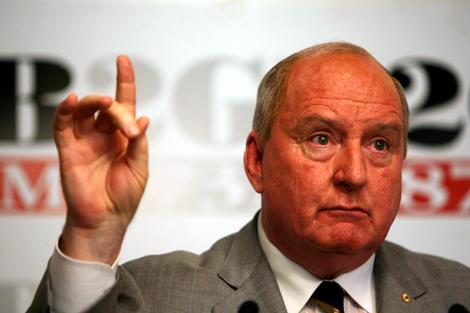
Radio 2GB broadcaster Alan Jones
Jones had become an influential morning radio announcer on the Sydney airwaves and Bob Carr, a former journalist, was ever aware of Jones’ influence on the public opinion of Carr and the Government.
Police Commission Ryan was held accountable and Carr publicly rebuked his Police Minister, Paul Whelan, accusing him of ‘taking his eye off the ball’. Whelan subsequently ‘resigned’ the Ministry and indeed then stood down from the seat of Strathfield.14
Carr, reacting to media pressure over the previous two years on both education and law and order, relied on his political regeneration argument that it is:
‘always a good thing in my view to replenish the leadership personnel in the middle of a term.’15
In late 2001, Carr replaced Whelan with ‘rookie’ Michael Costa in the Police Ministry and Aquilina was replaced by John Watkins in Education.
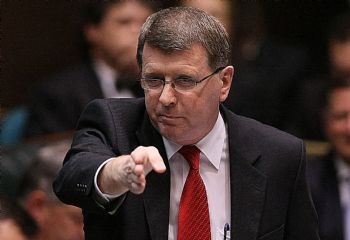
John Watkins MP
Right heavyweight Richard Amery was moved from Agriculture to Corrective Services portfolio and junior minister, Morris Lemma, had Sport and Recreation to his workload.16 Costa had come from obscurity to prominence with the support of Alan Jones, dating back to a charity dinner in April 2001 for the Neurological Institute for Schizophrenia and Allied Disorders (NISAD).

Michael Costa MP
Costa had been in Parliament for only 17 days when Carr chose him to replace Paul Whelan in the police ministry.17 Carr was asserting his authority but he was also reactive to bad publicity led by the media influence of Alan Jones. By April 2002, Costa had removed Police Commissioner Ryan18 and in doing so set a poor precedent of undermining the independence of the public service from the government of the day.
During 2002, the NSW Department of Community Services (DOCS) had been exposed in repeated controversy over maladministration of child protection, contributing to several tragic cases of child abuse. It too embarrassed the Carr Government.
Carr reacted to the media criticism by removing DOCS head, Carmel Niland, and shuffling Minister Fay Lo Po to the backbench. Carr replaced Lo Po with the younger Juvenile Justice Minister, Carmel Tebitt, again applying his government regeneration argument.
Carr is quoted as saying:
“It is always good in Government to freshen up with personnel, and just as Michael Costa and John Watkins have made a big difference by bringing new ideas and new approaches to education and police. So I think a young woman, Carmel Tebitt, will represent generational change in the Government as well. Useful generational change.” 19
In 2002, Carr’s Gaming and Racing Minister since 1995, Richard Face, was also set to be put out to pasture. A subsequent ICAC fine against him in 2004 revealed that Face had been under stress and depressed at the time of the 2003 election.20
In the lead up to the March 2003 election, Carr’s Minister for Fisheries and for Mineral Resources Edward (Eddie) Obeid MLC was the subject of controversy associated with what became known as the Oasis Affair21 , however, prompt investigation by the NSW Independent Commission Against Corruption (ICAC) found ‘no evidence that any donation was made to the ALP in relation to the project’ and…that ‘no findings were made that Mr Obeid ever solicited such a donation’.22
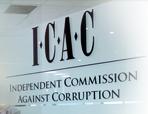
NSW Labor had gone into the March 2003 election as the incumbent government of two four year terms, ‘popular, cashed up and running on a track record of sound economic management’.40 Carr’s personal popularity had polled a 57% approval rating.
NSW Labor’s emphatic electoral win ‘was very much built around the presence of Bob Carr as leader.’41 The victory was reportedly mainly attributed Carr’s personal popularity in the electorate. But then Labor’s $10.7 million election advertising campaign had well exceeded that of the Coalition and the general indeed public mood was that the Coalition leader, John Brodgen, was considered too young, inexperienced and unknown to contend the Premiership.

John Brogden MP
External factors were also at the time pre-occupying the NSW media- most notably the US war in Iraq, unfolding on nightly television screens.
Yet, NSW Labor’s win firmly entublicly denounced as a "demon" and a "mongrel bureaucrat" by radio announcer Alan Jones.27
.jpg)
Carl Scully MP
Scully himself eventually became the target of the Opposition and the media and so a weak point in Carr’s political armour.28 When Scully on 17th March 2003 (days before the election) released the Government's transport policy without public support of the Premier Bob Carr, it was read in the media and Opposition that Scully had become a liability for Mr Carr's campaign and would be stripped of the Transport portfolio after the poll.29 Scully’s embarrassment of the Carr Government would later contribute to Scully’s failed bid to succeed Carr. A week after the election, Carr handed Costa Transport and a week hence Deegan was ‘removed privately’ on the basis that Costa had “decided to restructure transport and Deegan was simply surplus to requirements”.30
4.3 Carr purges public service failings
In 1995 when Carr had entered his Premiership, he had inherited the Greiner Liberal Government’s fixed-term contract system of the public service, adopting the United States model. The Public Service Board had been abolished some years prior in 1989. The combined result was that senior departmental executives had become more accountable to ministers for their performance. The authority to appoint and terminate chief executive officers now rested with ministers, so ministers now held greater influence down the chain of command. On the other side of the coin, the independence of the public service from government of the day was seen to be undermined.
As journalist Quentin Dempster noted that by 2003 after eight years of incumbency, Carr had promoted ‘a cult of personality around him, something of a Medici court has developed with its own backbiting, rivalry and competition for access and inside influence...the days of “frank and fearless” independent advice to government were over’.31 Public-sector management in NSW had become politicized. If a minister was not comfortable with the department or agency head, that head could roll.
After police deputy commissioner Jeff Jarratt was sacked in September 200132 while Paul Whelan was Carr’s Police Commissioner, Jarratt successfully won a High Court ruling that his summary dismissal had been unlawful, The Chief Justice, Murray Gleeson, had said the notion of public servants holding office only at the pleasure of the Crown was "difficult to reconcile with modern concepts of government employment and accountability".33 But Carr immediately amended the Public Sector Employment and Management Act to allow executives to be removed at any time without reason, regardless of performance-appraisal procedures. This measure was described as “Bob Carr’s off-with-their-heads clause”.34
As soon as Carr appointed Michael Costa as Transport Minister on 2nd April 2003, three senior bureaucrats were purged. Michael Deegan, Director-General of the Transport Department and Coordinator-General of Rail was sacked and with Costa’s announced restructure, Howard Lacy, Chief Executive of State Rail and John Cowling of the Rail Infrastructure Corporation were out.35 They had embarrassed the Carr Government over issues of public transport safety and were seen as scapegoats of the failings of Carr’s previous Transport Minister Carl Scully, but Scully was moved sideways into the Housing portfolio.
As soon as Carr expanded John Della Bosca’s ministerial portfolio to Della Bosca's ministerial responsibilities to include Commerce, Finance, Industrial Relations, Ageing and Disability Services, Director-General of Public Works and Services, and Chair of the Australian Procurement and Construction Ministerial Council, Dick Persson, was out.
By November 2005, Labor’s public service purging was rampant as Crikey36 then list of senior scalps reveals:
• Mal Hemmerling: sacked as CEO of SOCOG by Michael Knight in 1997.
• Ken Baxter: Bob Carr hired Jeff Kennett’s top bureaucrat when he won office in 1995 but then fired his departmental secretary in 1997.
• Energy Australia Board: Treasurer Michael Egan sacked all six board members of what was then Australia’s biggest electricity distributor in November 1997 but never really gave an adequate explanation.
• Helen Bauer: sacked in 1998 after just 15 months as head of the difficult Department of Community Services.
• Major General Horrie Howard: Director General State Emergency Service. “Retired” not long after the April 1999 hailstorms debacle but was given a couple of board positions.
• Kaye Loder: sacked by Bob Carr as chairwoman of the NSW Casino Control Authority in April 2000 after making comments on Four Corners suggesting she would prefer drug money went through the Sydney casino rather than interstate.
• Ron Bruce: sacked from his State Rail position in charge of the Tangara train project a few days after the Waterfall inquiry.
• Grahame Bush: stood down as chairman of the South Western Sydney Area Health Service over the Camden and Campbelltown hospital scandals.
• Jennifer Collins: sacked as general manager of the Camden and Campbelltown Hospitals but since exonerated by ICAC and now running an unfair dismissal action.
• Paul Forward: quit as CEO of the Roads and Traffic Authority last week after what Roads Minister Joe Tripodi called “a grave mistake” in not disclosing full details of the financial liabilities for taxpayers in the Cross City Tunnel contract.
• Robyn Henderson: sacked as head of the Deparment of Women whilst on holidays in Portugal.
• Howard Lacy: terminated as CEO of State Rail when Michael Costa became Transport Minister in 2003.
• Jan McClelland: sacked from the Department of Education and Training following Andrew Refshauge’s move from Planning.
• Jock Murray: sacked as director general of Transport under Carl Scully.
• Arthur Smith: former deputy CEO of State Rail was sacked a few days after the Waterfall inquiry.
• Bob Smith: Director general of the Department of Land & Water Conservation (DLWC) from 1995-96 and at the same time DG NSW State Forests, removed by then Minister in 2003 when department merged with Planning and there were some timber supply issues.
• Alex Walker: departed as CEO of Sydney Water in 2003. The Opposition claimed at the time he was “made to carry the can for the board and the government’s incompetence”.
• Ian Southwell: sacked as CEO of the South Western Sydney Area Health Service over the Camden and Campbelltown hospital scandals
• Brain Steffen: sacked as Director-General of the NSW Ministry of Energy and Utilities in February 2004 by Frank Sartor.
• Amanda Adrian: sacked as Health Care Complaints Commission by Health Minister Morris Iemma in 2004 after the inquiry into the Camben and Campbelltown hospitals.
and…
• Michael Deegan - DG, Dept of Transport
• Sue Holliday - DG, Dept of Planning
• Simon Lane - CEO, State Rail
• Dick Persson - DG, Public Works
• John Wynn - Owens Ex Director General, Health
• John Rogan - Ex Deputy Director General, Department of Transport
• John Brew Ex - Chief Executive, State Rail Authority ( before Simon Lane)
• John Stott - Ex Chief Executive, State Transit Authority
• Judi Stack - Ex Chief Executive, Rail Access Corporation
• Terry Ogg - Ex Director General, Rail Services Authority
• Paul Crombie - Ex Director General, Tourism
• Tony Thirlwell - Ex Director General, Tourism ( Crombie’s successor)
• Carol Davis - Ex Chief Executive, AntiDiscrimination
• Ken Cripps - Ex Deputy Director General, Premiers
• David Field - Ex Chairman of Sydney Ports Corporation
• Jane Diplock - Ex Director General, TAFE ( before Jan McCelland)
• Peter Cunningham - Ex Valuer General
• Gary Stainton - Ex General Manager, Business
• Bob Wilson - Ex General Manager, Sydney Water
• Tony Wright - Ex Deputy General Manager, Sydney Water
• Marianne Hammerton - Ex Director General DADHC
• Jane Wolfe - Ex Deputy Director General, Commerce. 37
Such purging revealed the desperate preparedness of the Carr Government to maintain a façade of accountability with the electorate by using ministerial power to scapegoat senior public service executives, instead of requiring ministers to accept responsibility for administrative failure. The scapegoating became rife and arguably institutionalised “as a tactic for short-term gain in media/public perception.”38
Carr’s personal penchant for journalism and media relations evolved into a hypersensitivity about his public image as Premier and his indirect monitoring of Sydney radio broadcaster Alan Jones is well documented. Carr’s autocratic message became clear throughout his Cabinet and right through the NSW public service - that those causing him public and media embarrassment would suffer the consequences. Carr’s autocratic management of the public service had become capricious.
Former NSW Auditor-General, Dr Louise Chappell, highlighted the systemic problems of Carr’s public service contract system of insecurity at senior levels and that it has encouraged public servants to pre-empt the political agenda of ministers rather than concentrate on strategic policy development.
Chappell critiqued the Carr Government’s public service purging:
“When government gets caught on issues management, it fails to recognise systemic policy problems and is unable to develop sound policy solutions. In such an environment, policy gets dumbed down – it becomes knee-jerk rather than a comprehensive, long-term and co-ordinated response to complex issues.” 39
Carr had become distracted by media image and the immediacy of public relations of issues of the moment, to the detriment of building effective long-term public policy and public infrastructure. But by now was Carr concerned with the long term for NSW or for NSW Labor?
4.4 Carr’s ‘generational change’ incites the Right Faction
.jpg)
Carr's Cabinet following the 2003 Election win
NSW Labor had gone into the March 2003 election as the incumbent government of two four year terms, ‘popular, cashed up and running on a track record of sound economic management’.40 Carr’s personal popularity had polled a 57% approval rating.
NSW Labor’s emphatic electoral win ‘was very much built around the presence of Bob Carr as leader.’41 The victory was reportedly mainly attributed Carr’s personal popularity in the electorate. But then Labor’s $10.7 million election advertising campaign had well exceeded that of the Coalition and the general indeed public mood was that the Coalition leader, John Brodgen, was considered too young, inexperienced and unknown to contend the Premiership.

John Brogden MP
External factors were also at the time pre-occupying the NSW media- most notably the US war in Iraq, unfolding on nightly television screens.
Yet, NSW Labor’s win firmly entrenched Carr’s leadership and his personal power and this handed Carr a sense of electoral mandate for a third four-year term to basically command, steer and reform the government completely on his own terms. It gave Carr electoral legitimacy to purge the poor performers, to purge particularly those who had embarrassed him in the campaign. Perhaps in Carr’s mind ‘embarrassment’ was not the term he would have used, but more a sense of failure of public service and ministers to live up to the high standards of public office. In any case, Carr as leader had borne the ultimate brunt of the media criticism over many failings of the NSW public service. Over many months of media scrutiny, Car would have felt frustrated that time and again the pubic service was failing the public and that senior bureaucrats were being hauled before the ICAC.
In Carr’s position as leader of the government and perhaps as is his prerogative, Carr felt a civil duty to right wrongs, fix the problems and remove incompetence. Carr identified the bad apples and purged. He also purged those who had dared to question his judgment or leadership. Carr was set to make his own new team and to the media he branded his purge strategy ‘injecting new blood and "generational change" into his cabinet.’42
But perhaps Carr’s justification for the purging and changes were not sold to the Party with the same energy and finesse as Carr had done publicly with the media. Was this a tactical oversight? It is likely the Party read, or misread the purging and changes not as in the noble interests of improving the standard of government, but instead as a self-centred outpouring of Carr’s autocratic scapegoating and his personal antagonism to those unsupportive of his political agenda.
By the 2003 election, Carr had for better or for worse created a divisive corrosive culture in NSW Labor – one was either loyally with Carr or vehemently against him. The problem for Carr was that his many purges and changes were regarded as Carr’s scapegoating and this only fueled the factional numbers against him.
After the 2003 election Carr instigated more organisational reforms. But this was to be nothing new from his previous and indeed ongoing ‘reforms’, largely attributed to bureaucratic departments and ministers embarrassing his credibility with the people of NSW and in turn exploited by influential anti-Labor media personalities. Carr after all had entered the Parliament during Neville Wran’s tenure as part of a process of regeneration. Government regeneration became a convenient argument for Carr to justify reshuffling his government, selecting the people of his choosing, as though a factional warlord in his own Right.
While Carr’s media oratory conveyed a sense of personal loyalty to the ordinary citizen, his decade in Opposition, characterised by battling internal party bickering and leadership manoeuvrings43 , left no love lost between Carr and Labor’s factions. People naturally tend to respond in kind to the way they are treated and factional bullying would not have been forgotten.
Immediately after the 2003 election win, true to form, the factional Right sought to reassert its influence. In the wake of what was regarded as Carr’s autocratic stamp of personal power, Carr’s branded ‘regeneration’, there were murmurings of a revolt against Carr, despite Carr’s personal popularity across the electorate being a key factor in Labor’s win.
The Right sub-faction known as the ‘Troglodytes’44 (or 'Trogs' for short) was led by Amery, who had recently embarrassed the Carr Government by poor performance of his Corrective Service portfolio.

Richard Amery MP
Amery was supported by menagerie of disaffected MP's headed up by Obeid and Aquilina of the opposing Right ‘Terrigals’ subfaction, both whom has similarly embarrassed the Carr Government and attracted the ire of Carr.
A few days after the election, the three ‘Trogs’ instigated an internal revolt seeking to raise the numbers to challenge Carr’s leadership. The Trogs commanded 13 of the 19 cabinet positions and sought promotion of upper house, left-wing MLC Ian McDonald to the Cabinet.
Carr cancelled his scheduled trip to the Hunter region and reasserted his authority and immediately dumped Amery, Aquilina and Obeid from their Cabinet portfolios. By 27th March, just four days after the election, Carr had reshuffled his cabinet, effectively crushing the revolt and holding a media conference justifying the move as reasserted his pledge to inject new blood and "generational change" into his cabinet.45 Later that day Obeid released a statement confirming that he was standing aside from the frontbench ‘reluctantly’ hopeful of still having a significant role in the Carr Government's third term.46
Scully’s embarrassment of Carr’s Government saw him demoted from Transport to Roads and Housing. Carr added Transport to Costa’s super-portfolio and that afternoon Transport director-general, Michael Deegan, who had been the butt of attacks of incompetence from Alan Jones, had been ‘removed privately’. Then went Howard Lacy, Chief Executive of State Rail and John Cowling of the Rail Infrastructure Corporation.47 Also ousted in Carr’s purge were Head of Planning NSW, Sue Holliday; the Public Works chief, Dick Person; and Bob Smith, head of the soon to be disbanded Department of Land and Water Conservation and State Forests. 48
Craig Knowles was appointed the new Minister for Infrastructure Planning and Natural Resources. 
Craig Knowles MP
John Watkins was moved from education to police. Carr’s Deputy Andrew Refshauge moved from planning to education.
Carr’s purging had not only diffused the Right’s revolt, it was hell bent on removing the non-performers and those who had embarrassed the electoral credibility of Carr’s Government. Many functions of government were chopped and changed, further purging of top bureaucrats continued. Of Carr’s original 1995 Cabinet, only six members remained.49 One insider likened the election aftermath:
“like there'd been a change of government..all of a sudden everything was up for grabs."50
Carr restructured his cabinet with younger ambitious supporters and since there weren’t enough around, Carr created new super-portfolios. Frank Sartor assumed the super portfolio of Energy and Water Utilities, Health (Cancer) and Science and Medical Research. Della Bosca assumed Commerce, Finance, Industrial Relations, Ageing and Disability Services.
'A ruthlessly powerful group of political hardheads now surround Carr – Michael Costa, John Della Bosca, Michael Egan and Craig Knowles, with Labor Party secretary Eric Roozendaal aboard.’51
Carr described his political tactic as one of conciliation that would become "the template for driving change".52 Carr’s reforms of the public service and his cabinet reshuffle have been critised as:
‘more designed to fit ministers’ personalities and power preferences, media agendas than coherence in governance, policy formulation or operational management.’ 53
Clearly, as an act of political survival in the circumstances of internal revolt Carr had had to quickly assert his authority and the most effective way was to purge the power of the protagonists. It must have been quite Shakespearian. At this point, the threat of mutiny had obviously tested Carr’s stoic patience his and McKellian compromising approach to reform. But Carr didn’t stop there. Trust was critical and with the higher probability of personal loyalty to be found in new blood, Carr maintained the momentum of radical change bringing in his new blood before the enemy could regroup.
But in doing so is purging and radical change also would seed angst and division within the Party.
Carr’s purge of departmental heads executed by his new recruits was seen by many factional discontents as political interference in the independence of the NSW public sector and concerns that this interference had been influenced by the media. The rules were changing according to the political players in power.
‘Carr’s ‘reforms’ were considered by many in NSW Labor, both Left and Right as Carr cronyism “the promotion of a cult of personality around him, something of a Medici court has developed with its own backbiting, rivalry and competition for access and inside influence. The independence of department heads from ministers was seen as compromised. If a minister was not ‘comfortable’ with the department or agency head, that head could roll. ‘Ministerial satisfaction’ became the new imperative and the public service was considered to have become politicized.’’ 54
Buoyant from a fresh sense of authority from winning the 2003 election, Carr had secured his popularity with the people and commanded what he must have felt as a personal electoral mandate. But Carr’s personal popularity with the people had been achieved at the expense of many in his government. Carr’s purges had made him irreconcilably unpopular within the Labor Party and throughout the government. Loyalty to Carr survived within his small select Cabinet clique of favourites, outside of which Carr’s alienation had sown the seeds of factional vengeance.
[Author’s note: Without being privy to the internal goings on, one can only gleam the reasons for the purge and the vengeance that followed from publicised accounts. Likely more personal issues were critical contributors to Carr acting as radically he did in the aftermath of the March 2003 election. No doubt it was a time of acute power struggle.]
[Next Chapter ] [Previous Chapter ]
[1] Shelly Savage, 29th July 2005, ‘Bob Carr, erudite and urbane?’, http://www.onlineo??, ABC Radio ‘PM’programme, http://www.abc.net.au/pm/stories/s420125.htm
[2] http://en.wikipedia.org/wiki/Bob_Carr
[3] Marilyn Dodkin, May 2003, ‘Bob Carr: the Reluctant Leader’(biography), UNSW Press, https://www.unswpress.com.au/isbn/0868407577.htm
[4] http://yourordinaryday.blogspot.com/2009/06/positive-mental-attitude-of-abraham.html#axzz0rFsjUeTs
[5] http://www.nps.gov/liho/historyculture/legacy.htm
[6] Tim Soutphommasane, University of Oxford,19 December 2005, ‘Bob Carr: Ethos was more important than ideology’, Australian Review of Public Affairs, http://www.australianreview.net/digest/2005/12/soutphommasane.html
[7] Tim Soutphommasane, loc. cit.
[8] Tony Harris, Ex NSW Auditor, ‘Clever Carr', Australian Financial Review, p82,
http://www.sydneyalternativemedia.com/id100.html
[9] ABC Online, ‘Carr's green credentials under fire’, Monday, 15th November 2004,
http://www.abc.net.au/news/newsitems/200411/s1244099.htm
[10] Tony Stephens, 15th December 2001, ‘Mild with Excitement’, Sydney Morning Herald.
[11] David Penberthy, ‘Carr’s out of control spin, Police, transport cost $1 million(a year)’, 17th July 2000, Daily Telegraph, p. 12 http://www.sydneyalternativemedia.com/id100.html
[12] http://en.wikipedia.org/wiki/John_Aquilina#cite_note-1
[13] http://www.smh.com.au/articles/2002/08/02/1028157844696.html
[14] Toni Hassen (reporter), Monday 19th November 2001, ‘NSW Labor Party on verge of reshuffle’, ABC Radio ‘PM’programme, http://www.abc.net.au/pm/stories/s420125.htm
[15] Toni Hassen, loc.cit
[16] ABC, ‘New NSW Police Minister vows to make changes’, Wednesday, 21st November 2001, http://www.abc.net.au/news/newsitems/200111/s422174.htm
[17] http://www.smh.com.au/articles/2002/08/02/1028157844696.html
[18] Quentin Dempster, (reporter), 10th April 2002, ‘Ryan quits as NSW top cop’, ABC 7:30 Report programme, http://www.abc.net.au/7.30/content/2002/s528362.htm
[19] Peta Donald (reporter), ‘Carr reshuffle to push DOCS off front page’, ABC Radio ‘PM’ programme, Thursday 11th July 2002, http://www.abc.net.au/pm/stories/s604698.htm
[20] Geesche Jacobsen and Natasha Wallace, 24th December 2004, ‘Career switch saves Face from prison’, Sydney Morning Herald, http://www.smh.com.au/news/National/Career-switch-saves-Face-from-prison/2004/12/23/1103391900347.html
[21] John Stewart, ‘NSW Govt tries to escape Oasis controversy’, 30th August 2002, ABC Radio National ‘PM’ programme, http://www.abc.net.au/pm/stories/s663395.htm
[22] NSW Independent Commission Against Corruption, 27th February 2003, ‘Report on investigation into conduct concerning the Woodward Park project’, p.2
[23] http://www.independent-nsw.com/obeid.html
[24] Quentin Dempster, 14th February 2003, ‘The "revolving door" syndrome in our prisons’. ABC TV Stateline programme, http://www.abc.net.au/stateli??, ABC Radio ‘PM’programme, http://www.abc.net.au/pm/stories/s420125.htm
[25] http://en.wikipedia.org/wiki/Glenbrook_rail_accident
[26] http://en.wikipedia.org/wiki/Waterfall_rail_accident
[27] http://www.griffithreview.com/edition-3/116-reportage/490.html
[28] Peter van Onselen, School of Politics and International Relations, University of New South Wales, Refereed paper presented to the Australasian Political Studies Association Conference, University of Tasmania, Hobart, 29 September – 1 October 2003, p.1, http://www.utas.edu.au/government/APSA/PvanOnselenNSWelectionfinal.pdf
[29] http://www.abc.net.au/news/newsitems/200303/s809299.htm
[30] http://www.griffithreview.com/edition-3/116-reportage/490.html
[31] Quentin Dempster, 2nd February 2005, ‘Media rules in the court of Carr’, Griffith University, http://www.griffithreview.com/images/stories/edition_articles/ed3_pdfs/dempstered3.pdf
[32] Michael Vincent (reporter), ‘Deputy Police Commissioner sacked’, 6th September 2001, ABC Radio ‘AM’ programme, http://www.abc.net.au/am/stories/s359659.htm
[33] Michael Pelly (Legal Reporter), ‘Sacking of deputy chief unfair, says High Court’, 9th September 2005, Sydney Moring Herald, http://www.smh.com.au/news/national/sacking-of-deputy-chief-unfair-says-high-court/2005/09/08/1125772641079.html?from=moreStories
[34] Quentin Dempster, 2nd February 2005, loc. cit.
[35] Quentin Dempster, ‘The Alan Jones factor?’, 11th April 2003, ABC ‘Stateline NSW’ programme, http://www.abc.net.au/stateline/nsw/content/2003/s829811.htm
[36] Stephen Mayne, ‘The huge list of fired NSW bureaucrats’, 2nd November 2005
Crikey, http://www.crikey.com.au/2005/11/02/the-huge-list-of-fired-nsw-bureaucrats/
[37] Andrew Williamson, ‘Sacked NSW public servants’, 6th November 2005, Crikey, http://www.crikey.com.au/2005/11/06/sacked-nsw-public-servants-for-tuesday/
[38] Quentin Dempster, 2nd February 2005, loc. cit
[39] Quentin Dempster, 2nd February 2005, loc. cit
[40] Peter van Onselen, loc. cit.
[41] Peter van Onselen, loc. cit.
[42] http://www.smh.com.au/articles/2003/03/26/1048653746331.html
[43] https://www.unswpress.com.au/isbn/0868407577.htm
[44] http://www.pollbludger.com/nsw2007/mountdruitt.htm
[45] Robert Wainwright and Paola Totaro, 27th March 2003, http://www.smh.com.au/articles/2003/03/26/1048653746331.html
[46] Sydney Moring Herald, ‘NSW minister opts out of new Carr cabinet’, 27th March 2003,
http://abc.gov.au/news/stories/2003/03/27/817411.htm
[47] Quentin Dempster, 11th April 2003, ‘The Alan Jones factor?’, ABC TV ‘Stateline’ programme, http://www.abc.net.au/stateline/nsw/content/2003/s829811.htm
[48] Paola Totaro and Joseph Kerr, 3rd April 2003,’Carr's poppy-lopping cabinet’, http://www.smh.com.au/articles/2003/04/02/1048962820401.html
[49] ABC News, ‘Carr defends female representation in Cabinet’, 2nd April 2003, http://www.abc.net.au/news/stories/2003/04/02/822647.htm
[50] Quentin Dempster, 2nd February 2005, loc. cit.
[51] Peter van Onselen, loc. cit.
[52] Quentin Dempster, 2nd February 2005, loc. cit.
[53] Quentin Dempster, 2nd February 2005, loc. cit.
[54] Quentin Dempster, 2nd February 2005, loc. cit.
[online material accessed up to 17th June 2010]

Chapter 3: Carr’s policy pendulum had reached its apex
Retired Premier Neville Wran described Carr as "the very model of a modern Labor premier, an articulate and powerful public performer who identified himself with the contemporary policy issues of education and the environment."1
Media commentary following Carr's retirement noted that Carr’s legacy was characterised by his successful Olympics (‘the best games ever’) and massive investment in capital works into hospitals, child protection services, improvements to education standards and literacy rates, in paying of the States debt.2 Most notably, Carr’s legacy is his commitment to protecting the natural, creating 350 new national parks, saving the South East forests and introducing native vegetation reforms.3
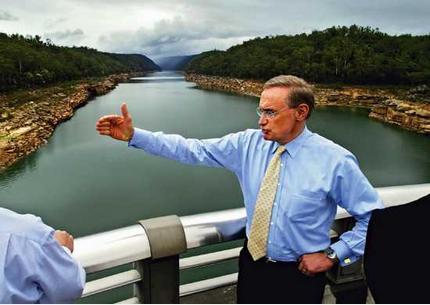
Carr is also credited for industrial relations reform, that NSW was the first state to apologise for the Stolen Generations and that his Government has stood with asbestos victims seeking compensation from James Hardie.4
In hindsight, possibly the pinnacle of Carr’s Premiership was the first day of the Sydney Olympics, Saturday 16th September 2000. Carr recalls:
They were old Australians and new Australians and I felt for the first time the sheer honour of representing these people and of being able to make decisions on their behalf at this time, perhaps the happiest time in Australian history.”
“I remember the first day of the Sydney Olympics, when Helena and I strolled up Circular Quay, after the start of the first Games event on the harbour, and we met Australians from very many backgrounds, united in pride in their city and excitement with the previous night's opening ceremony.
These were NSW’s glory days. A new century, a buoyant economy, a big head; Carr’s home town Sydney all spruced up to host the Olympic Games on the world stage.
Carr, a former journalist, was an adept manager of the media. He was able to anticipate and head off potentially damaging issues and close down debate. Although some of Labor’s internal debate and threats presented by a media-driven policy agenda, make it into the public realm.6 From 2004 as Labor fell into a policy hole, Carr had allowed NSW Labor to become publically criticised for failures in the State’s public infrastructure (rail safety, roads, hospitals, electricity) as a result of poor long-term planning and economic growth across the State was starting to slow as a result. By 2004, basking in the Olympic glow had allowed the State to lag economically. The Waterfall Train Derailment in early 2003 had focused media attention on the problems with the NSW passenger rail system.
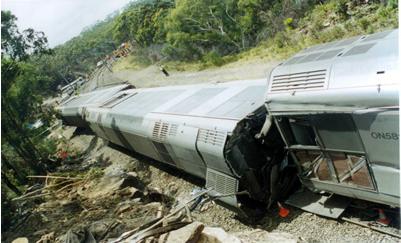
The Waterfall Train Derailment, 31-Jan-03, involved a 4-car commuter train derailed south of Waterfall Station.
The NSW Opposition had highlighted the State’s worsening economic conditions, systemic problems with Sydney’s trains and with the health system. Opposition Leader John Brogden proposed Carr’s reason for quitting:
"So, as he looked to the next 20 months, I think he realised that things were going to get worse and not better, so as a clever politician he picked his time to go."7
Daily newspapers and radio shock jocks are unrelenting in their criticism of government and can wear anyone down over time. Certainly, public feeling had turned against Carr, but the Sydney media have rarely been kind to NSW governments as it doesn’t sell papers or attract ratings.
Carr came under direct attack from Sydney Radio 2UE’s popular announcer, Alan Jones, who Carr labelled as a Liberal Party pamphleteer. Carr had instructed his ministerial staff to monitor Jones meticulously to prepare same-day responses and action plans to address any issue raised.8
A year after Carr’s resignation, he was interviewed by the ABC’s Maxine McKew about his time in office. Carr said of the Sydney Morning’s Herald’s campaign against him labelled ‘The Great Carr Crash’:
"Oh yeah, it was barking mad. In ten years as Premier we allocated 61 billion to new capital works and throughout all that period the Fairfax media attacked me for spending too much money. Now under this editor, they switch their line.”9
Political columnist Shelly Savage at the time of Carr’s resignation observed, that Carr’s later-term style was typified by a more cautious policy approach, letting the ball drop in regard to funding the public transport system.10
Columnist, Michael Duffy, at the time of Carr’s resignation reflected on the rail tragedies of Glenbrook and Waterfall under Carr’s premiership, the series of devastation bushfires across the state, the mismanagement of national parks and the increased unaffordability and unavailability of housing across Sydney.11
Carr’s environmental legacy was undermined by his signing of regional forest agreements with the Howard federal government respectively in 2000 and 2001 allowing logging in old growth native forests on the State’s North East, Southern and Eden hinterlands.12
Perhaps the single act that undermined Carr’s legacy, and in particular his credited environmental legacy, was his undermining of environmental protection legislation on the introduction of the infamous Part 3A environmental amendment Bill in the weeks before his resignation.
Carr’s then Minister for Planning, Craig Knowles, introduced the Bill in the Legislative Assembly on 27th May 2005. The Bill effectively changed the Environmental Planning and Assessment Act to allow the Minister of Planning to overrule environmental restrictions on any development proposal the Minister deemed a ‘major project’ or ‘critical infrastructure’. So it was a transfer of absolute planning power to the Minister for Planning and a removal of public transparency, local accountability and consultation and all appeal rights regarding land use development through the State.
Clearly this law played into the hands of the powerful corporate developer lobby which had become strong backers of the NSW Right in political donations. It was an early sign that the NSW Right was reacting to the slowdown in the NSW economy. The government’s fastest and easiest way to reinvigorate growth was to facilitate development by simply changing the planning laws to overcome environmental compliance hurdles.
Knowles in his speech introducing the bill two months before Carr resigned said:
"There is no doubt that this bill dramatically improves the climate in which to do business in this State. The bill implements important elements of this Government's planning reform program—a program which is overhauling our planning system and cutting red tape at all levels…" 13
And so upon ‘Part 3A’ Bill being introduced to Parliament on 27th May 2005 so began a retrograde chapter in NSW political history. The NSW Right in order to achieve its end of economic growth was now prepared to undermine the democratic planning process and do as Graham Richardson once coined, “whatever it takes!”.14
The Labor factions had also become critical of Carr to the point of seeking vengeance, but that is a topic for the next chapter.

‘the best games ever’
[Next Chapter ] [Previous Chapter ]
[online material accessed 9th June 2010]
The rise to effective control of NSW Labor, by its then Centre Unity faction, emanated from the days of uncertainty and a power vacuum created when Premier Bob Carr suddenly quit mid-way through a stable NSW Labor’s third consecutive term in office. A political vacuum is a dangerous situation, one just shy of relative anarchy, and a magnet for Machiavellians; a vulnerable time for governance.
Perhaps it was the milestone of being ten years in the job, following in the footsteps of Neville Wran, who had also spent ten years in the top job. Carr after all did serve in the Neville Wran government as Minister for Planning and the Environment. Carr made the decision to retire reflecting on a sparkling Sydney day at the weekend in consultation with his wife, Helena.1 The following Wednesday 27th July 2005, out of the blue, Carr announced his decision. A week later, Carr was suddenly gone from the premiership, and from being the member for Maroubra, and from parliament and from public life. In NSW, a chapter of stable leadership was suddenly over.
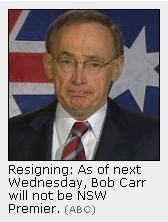
Carr’ departure was a shock to NSW and to his colleagues. Perhaps only his wife had known of his decision in advance. He had informed Federal Labor Opposition Leader Kim Beazley and a few staff members before informing his Cabinet colleagues that morning. But Carr’s declaration was quite consistent with Carr’s leadership style. Carr has always been his own man, forthright, even arrogant and even egotistical, but never anyone’s puppet politician. Carr was renowned for being a charismatic leader, intellectual, hard working, cautious yet stubborn and secretive.
But who is perfect, not least in the context of he unnatural demands of politics and media?
As Victorian Premier Steve Bracks pointed out at the time, Bob Carr was not only an outstanding Premier of New South Wales for ten years… “it also should be remembered that he was the leader of the Labor Party before that for seven years…so he's had 17 years as leader of the Labor Party in New South Wales, 10 of those years as Premier, seven years as opposition - he's done an outstanding job."2
Yet perhaps the hints were there. Labor’s handle on public infrastructure was waning, the critics were never tiring, but perhaps Carr was and perhaps his motivation was. Carr had said that ten years was a "long time" in office and he had passed Neville Wran's record as the longest-serving State Premier.
Perhaps Anne Davies, the Herald’s State Political Correspondent at the time, was right when she concluded that “the sun had gone out of the job for him’.3 But then in his resignation speech Carr proclaimed, “there is never a perfect time in these things.”4
On 30th June, a month before Carr’s resignation, Federal Labor Senator for NSW, John Faulkner, (a prominent Left Faction member) in launching Bernie Lagan's book, ‘Loner: Inside A Labor Tragedy’ accused NSW Labor of a ‘gladiatorial culture’:
“In NSW, a combative organisational culture has at times turned toxic. When maintaining factional power is put ahead of civility, decency, honesty, humanity or even legality, then bullying and thuggery become lazy substitutes for debate. Behaviour unacceptable outside NSW Labor is all too often rewarded within it....As an active member of the NSW Labor tribe; I know how hard it can be to draw a clear distinction between the ritualised conflict of Party forums and the real world.”5
So this is what Carr was up against internally within NSW Labor. Lagan’s book sounds like an insightful read. Labor factional infighting within the Left and the Right, ambitious backbenchers denied cabinet portfolios, a malicious media. After 17 years as party leader yet no relaxation of politics, there was probably a hint of reasoning in Carr’s resignation speech in which he said:
“Sharing this past weekend with Helena - one of those beautiful Sydney weekends - I and she were impressed by the notion that you could spend more of your time in a nice way, and we decided that time had come.” And quoting from his hero, Abraham Lincoln, Carr said he was bowing out of politics "with malice for none, with charity for all".
Perhaps similar insight could have been read into the praise offered by Western Australia Premier at the time, Dr Geoff Gallop, who said Carr's absence will be felt. "He's been a mentor to all of us, he's a leading figure in the Australian Labor Party and you know that in New South Wales he'll be sorely missed."6
In any case, after seventeen years of party leadership, it was Carr’s prerogative to step down and do something different. Apparently, he had no job offers at the time either in federal politics or in private enterprise, although he wasn’t idle. Eleven weeks later on 10 October 2005, Macquarie Bank announced he had been appointed to the Bank as a part time consultant. His role was to “advise the Investment Banking Group from time to time, on policy and strategic issues, both domestic and international, and with particular focus on Mr. Carr's specialist knowledge of the United States, China and Europe.”7
Despite Carr’s haste to resign and leave politics, he felt he had responsibly left at a time convenient to the NSW Government and with it in a sound position.
"They'll go to that election with an unprecedented $37 billion infrastructure plan and the state's finances in excellent shape. "Whoever that leader is, they will have my full support, Carr said." “The Government's got a big majority. The Government's got a buffer in the Parliament beyond that majority. The Government, even after a difficult mid-term period, is in a winning position in the polls. The Government's got a $37 billion four-year capital works program that it's implementing.”8
These are good solid advantages for this Government, and the electorate might well find it refreshing to have another man or woman in the job, after having had me there for 10 years.”
But as for succession planning, Carr distanced himself. By this time he had decidedly severed his attachment to the Party and its future. Carr said on his departure “I'm not going to baptise a successor. That would be, by any measure, inappropriate. I leave that to my parliamentary colleagues. "One of my trusted Cabinet colleagues will have 20 months to establish him or herself before the election," he said.10
And so it was at this moment that Carr left his Cabinet colleagues to fend for themselves. Well aware of the brewing factional scheming, Carr would have realised he was abandoning his colleagues to the factional wolves.
[Next Chapter ] [Previous Chapter ]
[online material accessed 6th June 2010].
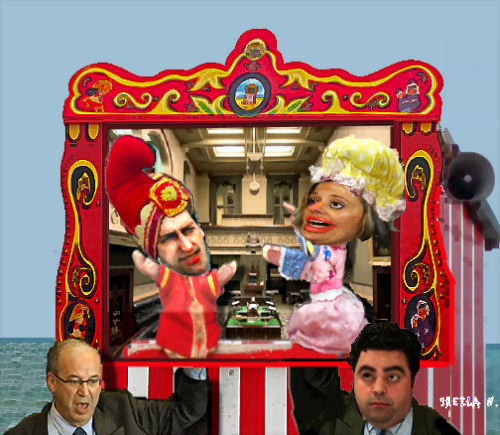
"Should I not be Premier by the end of this day, let there be no doubt in the community's mind, no doubt, that any challenger will be a puppet of Eddie Obeid and Joe Tripodi." ...and with those prophetic words on 3rd December 2009, the next day New South Wales’ second puppet premier Nathan Rees bowed from the public limelight.
When unelected political factions become puppeteers of government the people have lost democracy. The Labor Party in Australia's most populous state New South Wales, since before it came to power in 1995 under Premier Bob Carr, has been under the powerful influence of right-wing factionalism, always behind the scenes. Immediately following a 17-year reign under Carr, the rise of the Labor Right has controlled the NSW Government, pre-selected candidates, appointed ministers and propped up successive puppet premiers. The NSW Labor Right has pulled the strings on the government like a puppet show. The influence started before Carr’s ‘reluctant’ leadership and controls the length of string of puppet numero due, Kristina Keneally.
This online paper provides an analysis of political faction influence from the days of Laurie Brereton through ALP’s Sussex Street’s factional machine and to the successive NSW puppet premiers between 2005 and 2010. This paper outlines the cancerous impact that political factionalism is having on democracy in NSW, identifies the emerging multicultural factionalism of NSW Labor, and proposes some answers to remove the factional scourge and to restore electoral trust back into NSW Government.
This online paper is presented in a series of Chapters, starting below with Chapter 1: The Rise of NSW Labor Right.
[Further chapters: John Marlowe's blog on this website]


Sparked by the political vacuum left by the sudden resignation of long serving NSW Premier Bob Carr in August 2005, the right faction of NSW Labor led by political heavyweights Eddie Obeid and Joe Tripodi quickly rallied to secure their factional control over the NSW Labor Government.
Along with the then General Secretary of NSW Labor, Mark Arbib1 , they headed up what has become known as NSW Labor’s right-wing ‘Centre Unity Faction’ or the ‘Terrigal Faction’.
Factional control with NSW Labor has a long history that can be traced back to its origins at the time of the Great War under Premier William Holman when power tensions flared between the parliamentary and extra-parliamentary wings of NSW Labor. In Michael Hogan’s political history paper of May 2009, ‘Template for a Labor Faction: The Industrial Section and the Industrial Vigilance Council of the NSW Labor Party, 1916-19’,
“in 1915 the 'Industrialists', led by the Australian Workers Union (AWU), resorted to a new form of internal party organisation in order to take control of the state executive and conference and impose discipline over Members of Parliament. The virulence of the split in the party over conscription in 1916 was intensified by the activity of this faction. The structure and culture of the Industrial Section, later the Industrial Vigilance Council, set the pattern for later factional organisation in the NSW and Federal Labor parties.”2
In NSW, the Labor Right faction has evolved to be a broad alliance of various right-wing prominent party members known as the ‘Centre Unity’ faction, following a more economically liberal and socially conservative political philosophy than Labor Left. Nationally, the Right has dominated the Labor party since Keating’s Prime Ministership and has held a majority on the party's National Executive.3
In NSW, the ‘Centre Unity’ faction probably dates back to the 1970s where Labor heavyweight, Graham Richardson, was promoted up through the ranks via the time-honoured channel starting off as NSW Labor’s assistant general secretary. ‘Richo’ then went on to serve in the NSW Cabinet and then in the Keating federal ministry during the 1990s. ‘During the 1980s and 1990s Richo was often referred to as a 'numbers man' for the right wing of the New South Wales branch of the Australian Labor Party. He was highly effective in this position and became known as a 'king maker.'4
NSW Labor Right factionalism has dominated NSW Labor since Carr led Labor to power in 1995, and likely long before that. Carr had been previously coerced by the right-wing ‘Centre Unity’ faction to stand as a ‘reluctant’ opposition leader. According the well informed, ‘no nonsence’ political website independent-nsw.com, the Terrigals sub-faction was active back in 1996 when a factional struggle ensued between Tony Stewart of the Trogs subfaction and Morris Iemma of the Terrigals sub-faction. Stewart outmaneuvered Iemma at a NSW Labor meeting held at the Lakemba bowls club to form the new Lakemba branch and elect office bearers.5
The Centre Unity faction has had two sub factions - the Terrigals run by Joe Tripodi and Eddie Obeid, and the Troggs which was originally run by Richard Amery and Tony Stewart. The Terrigals are so named because Obeid has a house in Terrigal and purportedly staged a factional strategy meeting there immediately after Carr resigned.
Obeid had been Minister for Fisheries and for Mineral Resources in Carr’s earlier cabinet. Following Obeid’s controversy in what became known as the Oasis Affair, despite being exonerated, Carr “had let it be known that he did not want Eddie in his Ministry after the 2003 election”.6 Obeid did not contest the caucus ballot for selection of Ministers and he resigned from Carr’s Ministry on 2 April 2003. Perhaps it was this rebuttal, that encouraged Obeid to reassert his power and influence two years later when Carr resigned.
Under the strong leadership of Bob Carr, these two political clans had co-existed in relative harmony, perhaps akin to how Tito, though his shrewd political cunning had managed to hold together the nationalist factions of the former Yugoslavia for so long.
With Morris Iemma's demise as Premier in September 2008, these two sub-factions split. Former Planning Minister Frank Sartor was also a key player up until he was sacked by the new premier Nathan Rees in that same month. Around this time, the right-wing Centre Unity faction has had the support of around 50 MPs, while the remainder have leaned to the Left faction, itself split between the hard left and soft left faction.
The Centre Unity faction split into four groups - the Terrigals, the Trogs, a group aligned to John Della Bosca and a group known as the Macarthur group which (included) Graham West, Phil Costa and Geoff Corrigan.
According to the ‘non nonsense’ website independent-nsw.com the membership of the Terrigals during Iemma’s premiership were believed to comprise:
Co - chairs:
• Eddie Obeid, MLC
• Joe Tripodi, MP
Members:
• Morris Iemma, MP , Premier of NSW
• Kristina Keneally, MP
• Tanya Gadiel, MP – (married to one time Labor Council assistant secretary Michael Gadiel and sister-in-law to Eddie Obeid's chief of staff, Aaron Gadiel).
• Angela D'Amore, MP
• Karen Paluzzano, MP
• Virginia Judge, MP - former Eddie Obeid staffer
• Michael Costa, MLC
• John Della Bosca, MLC
• Eric Roozendaal, MLC
• Reba Meagher, MP
• Carl Scully had been a former member under Carr’s premiership.7
Subsequent members added:
• Noreen Hay MP
• Cherie Burton MP
• Matt Brown MP
• David Campbell MP
• Barbara Perry MP
• Michael Daley MP
• Ninos Koshoba MP
• Ian MacDonald MP
• John Hatzistergos MLC
• Henry Tsang MLC.8
By late 2003 and the famous Labor Right dinner at the Italian eatery, Al Ponte, at Darling Harbour, almost half of the lower house NSW Labor Caucus comprised the combined sub-factions of the Labor Right - some 24 of a total 55 Labor caucus members dined, vented their factional spleen...and plotted.
[Next Chapter ]
[online material accessed 4th June 2010].
This article was first posted as a comment to an article by Tim Murray, but I decide to turn it into my own blog entry after it was pointed out that the size of this comment caused Tim's article to be dwarfed.
Tim Murray, in his excellent article "Is the home-building industry the prime mover of our ecological ruin?" of 31 December 2008 wrote:
"The former Premier of New South Wales, Bob Carr, once offered Australia a choice. It could sustain jobs and economic security by using its brains, by being a smart economy, by adding value to the products it produces and by transforming manufacturing. Or it could continue to be a 'lazy Australia' that depends on job growth simply by driving up population numbers and depending on the growth you get by building homes and shopping malls. And that is indeed what is it has done, adding a third to its population in less than three decades."
These words point to the essence of the problem.
Population growth is an 'easy' way for those, who have guided this country's destiny for at least the last three decades, to enrich itself. But, the evidence, not to mention, common sense and basic intuition, tells us from the point of view of this society as whole, we can only become poorer and not richer as a result. Firstly, the access of each one of us to our natural resources must necessarily be reduced on average, and secondly, although, less intuitively obvious, increasing population size, once an optimum population size has been passed, creates dis-economies, rather than economies of scale. It costs more per head of population as our cities become more packed, to build and maintain the infrastructure necessary to provide, transport, water, electricity, health care, education and other essential services. However, paradoxically, as we become poorer an average and as we steal ever more wealth from future generations, a small elite become wealthier.
The way to become wealthier as Carr implied was to build up a manufacturing and science base using the talent we already have within our shores. This indeed happened, when Australian had a population of only 7 million between the First and Second World Wars. Although not a well understood fact Australia, as a result became largely self-sufficient and, through the strength of its manufacturing base able to sustain a navy and air force and an army with eight fully-equipped divisions by July 1942, was able to deter the Japanese from persuing their plans to invading Australia in March 1942, even before their defeat by US forces at the Battle of the Coral Sea. This country was a world leader in technology. This is the thesis of Andrew Ross's "Armed and Ready - the industrial development and Defence of Australia 1900-1945" of 1995. Although largely ignored since 1995, it has yet to be challenged bay any comparable work. This was the subject of a discussion on Online Opinion and I made use of it in an article "The myth of the Howard Government's Defence Competence" of 21 November 2007.
Had Australia maintained that technological lead, I believe that we would have been a more prosperous nation as well as a more equitable and democratic nation and we would have stood a greater chance of achieving sustainable technological base. However it seems that it appears that it suited an elite within our society which has come to guide our destiny to throw all that away in order to be able to enrich itself at the expense of the rest of us and this process continues today.
Notwithstanding Bob Carr's very apt comments, I just cannot accept that he was ever sincere. Of course, he always sounds sincere, but his actions, and even his words, on other occasions belie these words.
Listen to Bob Carr's moving words, at an ABC sponsored public 'forum' on 18 September 2008, about how we were all warned as far back as the 1970's about the perils of global warming and then ask yourself how a man with this knowledge could have then been responsible for the massive expansion in NSW open cut coal mining which is not only helping to fuel global warming, but also destroying NSW's own environment.
Although this was supposed to be a 'forum', in the typical style of Bob Carr who, throughout his career has avoided critical scrutiny even more determinedly than the fabled Count Dracula avoided sunlight, limited question time to 10 minutes.
However, the written comments at the end of the page give an overwhelmingly damning verdict of his legacy. Here are some:
"Bob Carr should have done a lot more reading when he was in office -- reading the reports about the shocking state of the health, education, transport and infrastructure of NSW. Then perhaps he would've done something about it. Or perhaps he would have arranged a succession plan when he vamoosed out of politics before it came crashing down.
"Or perhaps he should've spent less time reading job offers from banks with connections to road-building firms.
"Bob Carr has always had pretensions of gravitas, but we don't have to prop up his delusions.
We are paying for his superannuated retirement, so could we give no public air time to his irrelevant ponderings -- his actions mean that his mental meanderings have no credibility."
This drew a defence:
I don't find Carr enormously stimulating, but you clearly don't have anything coherent against him - apart from his unsatisfactory chin. Harold Bloom - he of the Western Canon - paid tribute to Bob Carr as the only senior politician whom he respected as an intellectual: www.podcastdirectory.com/podshows/2890398.
... which, in turn drew a further response:
"I'm not searching for deep intellectualism in my politicians. If I were, Malcolm Turnbull and Tony Abbott would rank well ahead of Bob Carr on sheer intelligence (although I know intelligence is not the same as intellect). I would say Harold Bloom didn't get around enough if he really thought Bob Carr was the only senior politician whom he regarded as an intellectual, or maybe he never met Edward Kennedy, Sir Edward Heath, Enoch Powell or dare I say it, Edward Whitlam 1 (what is it with Edwards?).
"You are being disingenuous when you say we complain only of Mr Carr's chin. We are complaining about his sale of public assets, his close relationship with businesses that profitted under his government, and the general ineptitude of his government."
Further comments:
"... Then was the disgraceful Workers Compensation Reform. Instead of making those who caused the problem pay he made the workers and community pay. ...We do not deserve these indecent preaching pratts but we have them."
"The collective disdain toward Carr in this blog gives me a glimmer of hope in humanity. There are actually people out there who are switched on to just how ridiculous this country has become. Our governments consist of individuals that could be considered criminals by any rational court."
"Give me a break. 'Human Decency' would demand an apology from this 'retired', at great public expense, ex-professional politician that never had real job or a degree from the university of life and probably the worse leader ever of this state, to the long suffering taxpayers and people of theONCE great State of NSW, for what he and his party have done to us. He should have the "Human Decency" to apologize. Tsk, Tsk ..."
"This is the man who recently gave his full moral support to Morris Iemma's and Michael Costa's attempt to privatise their electricity assets of NSW in spite of the fact that Iemma had ruled that out prior to the 2007 elections and in spite of the fact that 79%-86% of NSW residents opposed privatisation - all quietly forgotten, at least, that is what he no doubt hopes.
"It is most strange how Carr seems so much more passionate about events in other times and the politics of other lands than he ever was about the political and events in the time and place, where as state Premier and potential federal Labor leader and, hence, potential Prime Minister, he could have made a lasting and positive impact on Australian and, possibly, world history. Of course, it is a matter of record that he did not and his administration will be remembered as one of the most inept, secretive and anti-democratic in the history of this county.
"I wonder if Bob Carr has ever contemplates how figures like himself are likely to be viewed in future times by people trying to understand this age through the fictional and non-fictional works of our time." - James Sinnamon
"It is sad indeed that Australian political life is so reduced that Bob Carr passes as 'interesting' and an 'intellectual'. In general Australian politicians lag about 20 to 30 years behind informed opinion on matters outside of their field of interest - personal power and privilege."
"Bob didn't show much human decency when he sold off Prince Henry Hospital, when before he was elected he promised he would save it.
"Long term illnesses, such as aids, mental illness and long term heart recovery, just to name a few, had this beautiful position on the coast to recover in. But he sold it off under the pretence of changing the laws to protect coastal lands, which actually just gave him the power to do what he wanted.
"Medical teams were disgusted and sad, because they knew they would never have such great teams and means for recovery again.
"Where is the decency in that? So I guess we have answered the question."
"Demonstrably, Mr Carr must have only a theoretical interest in human decency.
Practically, he squattered the housing boom in NSW during the 10 years that he was Premier with the result of infrastructure breakdowns, health meltdown, etc of essential services."Pity that a well read man such as Bob Carr only make sounds which practically signify nothing in what he did.
"There are basic flaws in a political system that rewards such hypocrisy."
"He is giving himself credibility but NSW knows bob the builder of tolls and tolled tunnels and fire sales of Acer Arena lowest bid wins and Sydney Showground foxy giveaways
"We get to pay the pension indexed to their former self served salaries... in addition to an office with staff a minder and a travel expense free ride....
"Parasites never leave the host until the host is totally consumed.
"If they have obviously stitched up a consultancy job in the private sector with prior intimacy ... then the perks should be suspended until they are needy.
"It would be 'humanely decent' if they gave up the perks until they are retired at 65 with a pension closer to the average wage and fund their own office and staff and carr transport.
"Take the Ted Mack pledge not to drain our Treasury for the purpose of supporting the people not the servants of the people... Ted was decent, nobody else has the decency he walked the talk and left no toll for his life's work."
"Bob carr.
"Decency?
"Why this man isn't in gaol is unfathomable.
"I notice that the very bank who owns the toll roads in sydney is now his employer.
"If this man is a letter of letters then the best place he should be writing his comments and memoirs should be behind a locked door. It is people like Bob Carr who have become a gnawing cancer in society, from their actions they encourage more illegal activity, thus throwing Australian society into the depths of the developing world. ..."
I could write pages more about Bob Carr's many other crimes against the environment, democracy, accountability and social justice. Whilst his environmental accomplishments were substantial in his early years, particularly his massive extension of NSW's National Parks, I think those accomplishments and all his fine words about population control should more properly be regarded as 'bait' to cause people environmentalists to forgive him for a massive slew of other pro-business and anti-environmental policies. To get an idea how 'bait and switch' is used , view Barrie Zwicker's deconstruction of the phony US dissident Noam Chomsky in the YouTube broadcast "The Shame of Noam Chomsky and the Left gatekeepers". I think Carr is a kind of fake-Malthusian variant of Noam Chomsky.
1. ↑ Edward Gough Whitlam is more widely known as 'Gough Whitlam'. Bob Carr has repeatedly spurned the legacy of Gough Whitlam, but had Gough's Government retained power, he would have prevented the population growth that Carr claimed to be against. Furthermore the Department of Urban Planning (or something with a similar name) which was abolished by Malcolm Fraser would have constrained the damage that developers were able to cause to our cities. For all of his flaws Gough Whitlam is an intellectual giant in comparison to Carr as the poster pointed out. Moreover, unlike the do-nothing government of Bob Carr, Gough's Government implemented far greater number worthwhile reforms (although most have been, sadly, subsequently dismantled).
A short article in the The Australian Financial Review of 24 September 2008 leaves the reader wondering what exactly was the point of NSW's extensive program of privatisations going back to the 1980's.
The article, "Bits and pieces won't fetch $1 billion" by Tracey Ong purports to show what options are available to the NSW government in its planned mini-budget to cover the claimed $1 billion-plus shortfall in its budget.
The article states, "The problem for Mr Rees is that the once-rich government asset portfolio has been depleted after two decades of reform." This 'reform' left, according to the article, apart from the electricity assets, the sale of which is now politically impossible, "only a handful of assets... worth offloading."
This surely begs a question from those who have held out privatisation to us as the panacea for all of our economic ills: Exactly what of enduring benefit has been achieved by past waves of privatisation?
Two of the principle justifications given for privatisation have been:
So what then happened to all the money 'freed up' from past privatisations? Why is it, as we are told, that NSW faces a financial crisis? If privatisation is supposed to make economies run more efficiently, how is it that NSW's economy has contracted?
The article lists the "prize assets" already sold: "TAB, State Bank and the Government Insurance Office (GIO)". Other assets that the article failed to mention are the Government Printing Office Printing, the Homebush abbattoir and the State brickworks, privatised by Greiner and FreightCorp privatised by Carr in 2002. In addition, large numbers of government buildings, housing stock and land were sold off, beginning from the time of the Wran Labor Government. That process was accelerated by the Greiner Liberal Government which came to power in 1988.
Much of NSW's roads have also been privatised and turned into toll-ways since the time of Unsworth under the different guise of "Public Private Partnerships", including the infamous Cross-City Tunnel that Carr inflicted upon the Sydney public.
This all begs further questions: How much longer can the process of privatisation continue, and what should the NSW government do to balance its budget once all the remaining assets are gone?
Typically, the article only proposes further privatisation to solve NSW's financial crisis. Other possible measures such as raising loans or obtaining additional revenue are not even contemplated.
Ong gives a list of assets which she tells us could be sold off immediately:
| Asset | Value | Operating Revenue |
| Forests NSW | AU$3.1billion | $AU280million |
| Sydney Ferries | Unclear | AU$119million |
| WSN Environmental Solutions | AU$203million | AU$18.5million |
| State Lotteries | AU$553million | AU$50.3million |
Others ruled out as politically too difficult include: Ports, Landcom, the four water corporations and, of course, electricity.
The article points out, even if any of the assets were sold, they would be sold at firesale prices.
Canadian Ronald Wright in A short history of progress (2004) wrote of economic neo-liberalism which demands privatisation of publicly owned assets:
"After the Second World War, a consensus emerged to deal with the roots of violence by creating international institutions and democratically managed forms of capitalism based on Keynesian economics and America's New Deal. This policy, although far from perfect, succeeded in Europe, Japan and some parts of the Third World. ...
"To undermine that post-war consensus and return to to archaic political patterns is to walk back into the bloody past. Yet that is exactly what the New Right has achieved since the late 1970s, rewrapping the old ideas as new and using them to transfer the levers of power from elected governments to unelected corporations -- a project sold as 'tax-cutting' and 'deregulation' by the Right's courtiers in the media, ... The conceit of laissez-faire economics -- that if you let the horses guzzle enough oats, something will go through for the sparrows -- has been tried many times, leaving ruin and social wreckage."(pp126-127)
NSW's record seems to confirm that privatisation is, indeed, just old-fashioned plunder as practised by the Conquistadores, Vikings, Mongols, etc. Revenue generating assets paid for over previous decades by taxpayers have apparently been sold off for no better reason than to line the pockets of private investors, bankers and stockbrokers.
The rightful owners of these assets are the public of NSW, who have paid for them through taxes and hefty bills, and no Government has the right to "offload" these assets without their informed consent. Whenever they have been consulted they have rejected it overwhelmingly. This, and not the failure to get the Labor Party's support, as the article implies, is the principle reason why electricity privatisation was stopped.
Whilst it is true that "domestic and overseas players lining up to get a slice of the action" were disappointed, given the harm already done to NSW by these parasites the NSW public surely owes them no more favours.
To the extent that the alleged NSW financial crisis (as opposed to the global financial crisis) is real it should be fixed by the raising of loans or by finding other fair and equitable means to raise revenue. It should not be "fixed" by selling off yet more family silver.
This article was originally posted on 20 Sep 2008
. It was revised on 1 Oct with the help of Sheila Newman, editor of The Final Energy Crisis (2nd edition).
See also: "Media contempt for facts in NSW electricity privatisation debate" of 19 Sep 08.
Recent comments